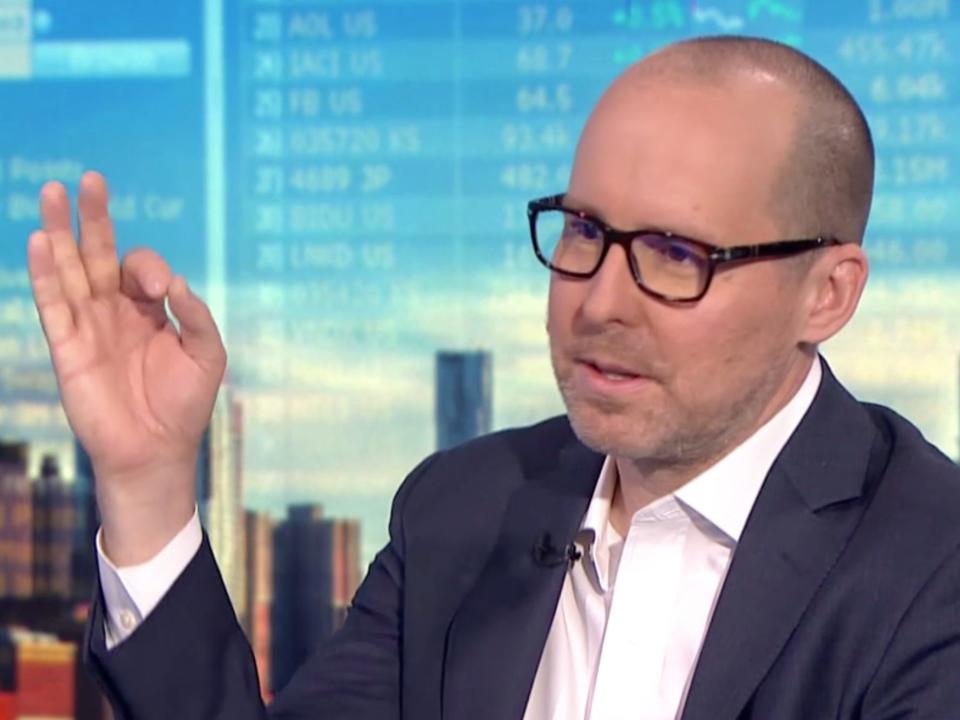'Black Swan' fund manager Mark Spitznagel expects the stock market to rally further before we hit the 'worst crash since 1929.' He explains how investors should think about their portfolios to survive the next few years.

Investor Mark Spitznagel says expect further euphoria in the stock market before it tanks.
Spitznagel's firm, Universa Investments, profits from market crashes via tail-risk hedging.
He says investors should avoid chasing the market or making decisions based on short-term Fed moves.
What goes up must come down, including the stock market.
Investors don't seem to learn that lesson, according to Mark Spitznagel, the founder and CIO of Universa Investments.
Spitznagel has gained a reputation on Wall Street for being bearish; lately, he has cited concerns that the largest-ever debt "bubble" will eventually pop, though he never says when.
His firm's flagship strategy, centered on tail-risk hedging, is set up to profit from explosive crashes through derivative contracts without trying to time the market, serving as insurance-like protection for an investor's portfolio. The fund made headlines for returning 4,144% amid the 2020 stock market crash, an example of a so-called black-swan event.
Virtually no one saw that crash coming, and Spitznagel avoids making timed market calls. However, in an interview with Business Insider, he explained why he thinks the ongoing stock-market rally will be followed by a historic crash that is triggered by the bursting of a credit bubble.
Since last year, Spitznagel has warned about the interest expense that the US government will incur on its record $35.5 trillion debt, which ballooned when interest rates were low. The hedge fund manager Ray Dalio is among his peers who have said that hefty debt repayments could slow the economy.
But Spitznagel is not interested in timing the crisis or the stock-market fallout. "It's not fair to call me a perma bear," he said. While he sounded the alarm last year in interviews and a January 2023 investor letter seen by Business Insider, he also said that a rally before the crash was possible.
The rally is playing out now with extremely positive sentiment, evidenced by the 17 closing highs the S&P 500 has already made this year. Spitznagel said people are jumping into stocks because they fear missing out on an opportunity they think is getting away from them. Those participating in this rally won't accept any negative sentiment coming their way; that's what euphoria is, he said.
"Markets are alive. They move to get people positioned wrongly," Spitznagel said. "We are instinctually herding animals, and we are momentum-based. And when the market moves one way, we think that's going to happen forever."
Investors have closely followed the Fed's tone on inflation and interest rates to determine when it will ease economic conditions. But that's backward: the market and economy will tell the Fed when to adjust its policy. By following the Fed, investors have wrongly positioned themselves at the bottom and will soon be wrongly positioned at the top, he said.
"We need to worry about the mistakes that we're making," Spitznagel said. "We're going to sell our position at the low, and we're going to buy our position at the high. This is what people did. This is what all these analysts have told people to do in the last couple of years. We're going to get the most bearish when the market looks the worst and we're going to get the most bullish when it looks the best, but the markets zig in order to zag."
And right now, we are in the late stage of a boom that's approaching its bust, he said. While Spitznagel has historically shied away from making timed calls, he said that the bust could happen as soon as this year but not before the market rallies even higher, reaching "euphoria" before it reverses.
"I continue to expect a blowoff, and then I expect a crash that will be the worst crash since 1929," Spitznagel said. "And my simple reasoning for that is that we are witnessing the bursting of the greatest credit bubble in human history, and crashes are direct consequences of the bursting of credit bubbles."
The Fed hiked interest rates like it was the 1970s, the decade that set the high watermark for inflation before its record was broken in the 2020s, he said. But what they have actually done is hiked us into this credit bubble, where debt that ballooned in a low-interest-rate environment is now hitting a wall. And although the consequences of that may have lagged, they are about to show themselves. It's going to result in a very hard landing, which is an outcome that most don't have in their bingo cards right now, he added.
Spitznagel's main don'ts to mom-and-pop investors are; don't chase the market, don't time the market, don't place too much confidence in its current direction, and don't make decisions based on short-term Fed moves. Instead, build a portfolio that's positioned so that if the market goes down by 50%, you won't be squeezed.
"Don't be the sucker that's going to sell down there. And if the market is up 50%, don't be the sucker that's going to buy up there", Spitznagel said. "So, have a position on where you're sort of agnostic to that. That's a big ask, but that's basically what people are going to have to do in order to survive the next year or two."
Read the original article on Business Insider
